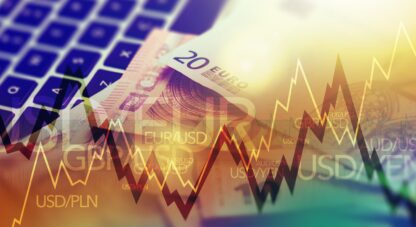Podcast: Play in new window
- January Will Give Us The Latest “New” Way To Understate Inflation
- “Arm Taiwan Now” – Former NATO Secretary General
- Register For the Tactical Short Call – Click Here
Don’t Like Inflation Numbers? Change The Calculation!
January 18, 2023
“We have a growing divergence between Fed policy and market belief in the durability of higher rates. That divergence is not going to play out well. The consequences could be very painful. If Powell doesn’t quickly back down, markets are going to have to come to terms with being overvalued again, very overvalued.” — David McAlvany
Kevin: Welcome to the McAlvany Weekly commentary. I’m Kevin Orrick, along with David McAlvany.
Well, it’s that time—a quarter again. It’s the Tactical Short call, isn’t it?
David: Yeah. I want to start with news of a meeting that you can’t miss this week—WEF and Davos, no, it’s not The World Economic Forum. If you feel the need for virtue signaling and platitudes from Champaign drinking socialists, of course, tune into Davos. No, you’re right, it’s Tactical Short time. And so join us for our quarterly call with Doug Noland. We’ll cover last year’s performance and the dynamics in the market, and take educated guesses on what 2023 holds for the financial markets, and of course, your wealth. If you’ve ever wanted to spend time talking with the smartest guy in the room, register for the call with the Tactical Short man and leave the Davos man to naval gazing.
Kevin: Yeah, no. Well, and I do subscribe to the World Economic Forum just to see what those guys are up to. Yeah, what used to be called conspiracy is now just called mainline thinking. I guess that’s what we’re supposed to do.
But you had mentioned something in our meeting. We have an office meeting before we come into the studio, and you said, “Did I dream that they are changing the way that they measure inflation again?” Accounting is such an important thing, and we’ve seen in the past that inflation, that number, has such a powerful impact on what people’s hopes and dreams are for the market. Anytime it starts to get a little too high, you just change the numbers.
David: Massage the numbers. Well, we had CPI numbers improving last week in some genuine form or fashion, and stocks—and virtually every risk asset along with stocks, from cryptos to the meme stocks—they went ballistic, which of course is just a big bet on easy money coming back, just around the corner. I was in Ohio over the weekend for a wedding, and got to share a few thoughts during the service.
Kevin: Okay, so let’s just stop there for a second because I don’t think you were prepared for that. You were told, “Hey, if you want to just say a thing or two,” and then you found out you were the message, is what you said.
David: Well, it progressed from, if you’ve got something you want to say, that’d be great. Just anything you want to say is fine. And so I called and said, I’d love to know kind of the format of the day and where I would come and just so I kind of know what’s coming and then what’s going to happen afterwards. If you wanted to take three to five minutes just to say something, that’d be fine—
Kevin: Just to say something, yeah.
David: And so I started thinking about what I wanted to say, and then when we got there, I looked at the order of service and I am the message.
Kevin: Yeah, you better be quick on your feet. So what’d you talk about?
David: Well, I did mention sort of the similarity between marriage and mountaineering.
Kevin: Now your wife was with you?
David: Yeah.
Kevin: Yeah, so it’s okay to— Yeah.
David: One of my reference points was between these two things, there’s a lot of things that are not in your control in both circumstances. There are more than a few uncertainties. It’s a grand adventure. It certainly takes courage and commitment to get to the top. And there are moments of exhilaration and occasionally moments of agony. And something I did not explore during the service, but if we had just taken more time, could have lingered on, is how powerful expectations are, and how they create the emotional swings you experience in both endeavors.
Kevin: Boy, isn’t that true, especially for the first year or two when you have these expectations and you think you’re going to change your partner, but actually the expectations that you have are probably what’s going to change.
David: What’s most humorous as you get to the end of year two and three is you begin to realize that you had expectations, because you go in thinking, “I have no expectations.” You just assume that what you assume is normal.
Kevin: Right.
David: Everyone sees the world the way you do. That’s not it. Expectations or assumptions, that’s just reality.
Kevin: And I’m going to guess that you’re not only tying this into marriage, but you’re going to tie this into markets because—
David: Well, of course, because I think today’s markets experience something of a false peak. We have what I believe is a false peak in inflation. And that commitment to believing that the worst is behind us is unfortunately what sets the markets up for greater fragility. As the experience of inflation lingers longer, that’ll be one form of disappointment, and then sort of bounces between what we had as the highs last year, fresh lows this year. But still, there’s room for higher numbers yet again sometime down the line.
We’ve talked about the reorganization of supply chains. We’ve talked about that as on-shoring, the diminished sheen on global trade and cooperation. Some have talked about that as deglobalization. Energy prices edging higher with both supplies being constrained and this long transition to less fossil fuel demand, and that hitting demand—eventually. And of course, labor costs recalibrating, all of which will continue to filter through and impact inflation numbers.
I think Bullard’s comments last week on inflation and interest rates were important. The false peak is when you think the hard effort is behind you and relief is coming. What you have in view looks like the mountaintop. And internally, you’re thinking, okay, it’s downhill from here. It’s going to be easier from this point forward instead of the slog uphill. Then you arrive. But there’s a new and higher horizon in the distance, and it begins to play with your head.
Kevin: Talk about false peaks. Let’s go ahead and talk about oil for a moment, because just think back, how much has changed since 2019? Back in 2019, Dave, we thought we would be oil and energy independent here in America. We didn’t need Saudi Arabia. We didn’t need OPEC anymore. Now, we’re just right back in that basket, aren’t we?
David: Our foreign policy reflects a permanent shift away from Saudi Arabia and OPEC with the presumption that we are now energy independent.
Kevin: Right. 2019.
David: The 2019 production was at 13 million barrels per day, and that was the peak. Shale was a revolution, and I think “was” is the key word. The benefits we’ve had in the past decade from increased domestic production, of course, they’re significant. And arguably that’s one of the pillars of strength for the US economy since the global financial crisis. But we have yet to recover that level of 13 million barrels post-pandemic. And you look at the different pockets—the Bakken play. Bakken production boomed early, got to as high as 1.5 million barrels per day. It’s down a third, and is continuing on a reduced trajectory. You’ve got a minimal rig count in that region, and it would take significant investment capital to see more production come online. I think investment capital, frankly, is going to be hesitant to return to that area. So to hold output steady—and this is the problem with shale—to hold output steady, constant drilling is required, and that is not happening. So you’ve got a declined rate, which is now getting ahead of new production.
Kevin: Yeah, even in this area, Dave, we’re down in the southwest corner of Colorado, right on top of a huge natural resources basin.
David: Yeah, I mean, San Juan is probably closer to Bakken in terms of it being sort of played out. But the Permian Basin’s not far from us in New Mexico and Texas, and Permian Basin is a bright spot. Aggregate levels of output are still anemic if you’re looking across the country. But the Permian Basin has some spare capacity, and that’s an area certainly to keep an eye on.
Kevin: So if you’re running a company, like an oil and gas company, how in the world do you manage? Because three, four years ago, we were managing for oil independence and energy independence, and at this point, these guys who are running these companies are having to figure out, do we drill more, or with this whole carbon footprint thing, do we actually back off and tighten up the books?
David: Well, I don’t think that’s keeping them from drilling, an increase in the carbon footprint. I think they were managing with free money.
Kevin: Oh, easy money.
David: And if they’re managing with free money, then yeah, why not borrow a hundred million, a billion, limitless spending if the cost is virtually zero? So I mean, a part of the issue is that investors in the space are now expecting capital discipline. You can’t just drill, baby, drill. And so energy executives have thus far met those expectations. They’ve increased dividends. They’ve got share buyback programs in place, and those are initiatives that have taken priority to drilling new wells. So the last cycle did not end well for companies that took investors for granted. Again, it was drill, baby, drill, managing with free money. Money is not so free anymore. So there’s some variables that are putting natural restraints, plus there’s some boardroom discipline that’s being expressed. And you’re right, because excessive drilling along with the decarbonization fears—that had hollowed out the investment sector within oil and energy.
Kevin: So if you’re an executive, are you looking at a change in the growth curve? Because the growth curve was pretty steep as far as oil and shale here in America. It probably isn’t going to continue, is it?
David: Well, I would take the word of the CEO at Pioneer. Scott Sheffield is very well respected in the space, and in a recent FT article, Financial Times article, had this to say about oil and shale production: “The aggressive growth era of US shale is over.” And I think he’s right, which implies a gradual decline in US production. And at some point it may fall off sharply without a massive infusion of capital into drilling. And at that point, the constraints are as much about labor availability as they are capital. And today, again, capital’s more expensive. But we’re moving into this period of time where if you wanted to expand, if you wanted to drill, can you find the people to get the job done?
Kevin: Well, and you’ve brought up the strange balance that we’ve seen over the last 40 or 50 years since we’ve been off the gold standard with the dollar. The old oil order, which has worked just fine over the last 50 years, is the dollar is supported as we support OPEC, but they need us to need them as much as we need them to need us. We were changing that four years ago. 2019, it was like, I don’t know that we do need you anymore. What’s this going to do to the dollar?
David: Yeah, no, that’s precisely it, because it’s the OPEC dollar recycling that we saw for decades which put a floor under the dollar. What we call the petrodollar today is our fiat currency being propped up on a trade basis by the arrangements we’ve had with Saudi Arabia and the other OPEC states. Jeff Curry I thought was very insightful. He said that the readily available spare capacity that could compete with OPEC, creating what we then called the new oil order, today, that flexibility’s gone, pushing us back to the old oil order of OPEC dominance. And he goes on to say that “the current level of underinvestment will shift the power in geopolitical heft back into the hands of the Saudis and OPEC members,” which is really unfortunate for us because we’ve done our very best to estrange those relationships in light of our energy independence, not recognizing just how fragile and how temporary that state actually is.
Kevin: So you just wonder if we’re going to be accepted back with open arms, or have Saudi Arabia and the OPEC nations, have they found other friends?
David: Yeah. Well, maybe it’s our bellicose tone, maybe it’s our attitude towards the Saudis and MBS, Mohammed bin Salman, that begins to smart as we try to re-embrace. And they say, “No, actually we don’t need you quite the way we used to. We found other people to guard our borders and keep us safe, to sell us arms.” And I do think that we see the power gradually shifting back to OPEC and the Saudis over the next 24 to 36 months. This is not an immediate issue with US shale, but as it gains steam, I think it becomes more critical. And the reality is, over the next 24 to 36 months, we get to see just how much those interests have realigned and priorities have been placed in the relationship with the Chinese.
Kevin: Well, and the shale industry was supposed to be deflationary on the price of energy. Do you see now inflation coming back into the picture?
David: It’s just one of those things that we have actually, since the global financial crisis, been able to take for granted, that not only in terms of the strength of our economy, which undoubtedly producing 13 million barrels a day does a little bit, when you’ve got enough for yourself and even enough to export. But I think what we’ve missed is how the long game in oil gets played, and we’ve been outplayed on the geopolitical front between the Chinese and the Saudis. We’ve made some serious missteps.
Kevin: Well, and you can make missteps when you’ve got free money coming in and virtually free energy. I mean, yeah, it costs money to get it out of the ground, but nothing like having to go to somebody else. So you wonder, do you make good decisions when the money’s flowing free? I mean, you as a business owner, Dave, if you just had unlimited funds, I’m sure you’d think, gosh, we can do this, we can do that. But you probably would get sloppy.
David: Yeah, I just think the net effect is that in a declining oil supply environment, inflationary price pressures from that energy, and then, as a knock-on effect, transportation and those inputs, it persists. So we can be very excited about how CPI is moving in the “right direction.” But I think the structural things that are there to support higher oil prices and energy inputs in the years ahead are still there.
To your point on how sloppy you get if you have access to free money, yeah, I think that’s just the way things go. You see it with bank lending standards over time diminish, and you go from needing a Ivy League education and a pedigree to get a loan to being able to fog a mirror, and then you can get a loan. So over time standards diminish, and with easy credit comes, sometimes, consequences. I think of it as the beer goggle problem. Sometimes we see things the way we shouldn’t. We don’t see them quite accurately. And I think easy money and cheap credit, that’s what impacts our judgment with meaningful results in the future.
Kevin: So going back to free money and easy credit, price really is not much of an issue if money’s not very expensive.
David: That was definitely the case this year. If you’re looking back to 2020 and 2021, the merger and acquisition deals done through that timeframe, ’20, ’21, you had $5.7 trillion in deals done globally, and those were on easy terms. And by the way, they were at peak prices. And that’s the problem. That’s where it appears now that everyone was seeing the world with beer goggles. You wake up in 2023 after a shift in macroeconomic variables, higher inflation, higher rates, it’s like waking up, taking off the beer goggles. What errors of judgment were made when the world seemed perfect? You just didn’t see things the way you should have.
Kevin: So how did they adjust that?
David: To some degree, it’s an accounting function. You take multi-billion dollar write-downs on assets that were overpriced at the point of purchase. And I think that is a common theme to expect this year in 2023. Inflation and higher interest rates are certainly factors in repricing. I can think of a couple times last year where we talked about higher interest rates having an impact on DCF models, discounted cash flow models, and that you would ultimately have to see a revaluation of publicly traded assets. But inflation and higher interest rates, those are factors in the repricing of intangible assets. That is not all that is in play. Goodwill is the premium over net asset value. And so just think about that. You pay too much for something, something that’s worth two bucks and you pay four for it. Two dollars is goodwill.
Kevin: So is that an official accounting term or it is not just tongue in cheek?
David: Yeah, it is. No, no, no, it is. It’s categorized as goodwill. It’s the premium over net asset value, that’s known as goodwill.
Kevin: Huh.
David: And again, let’s just think of it as the amount of one company overpays to get a deal done. Goodwill is carried as an asset on the company books until you have to revalue the whole asset, and then goodwill gets kicked to the doorsteps or gets kicked out the door. You had write-downs of about $6 billion in 2021. You had goodwill that had been carried on company balance sheets as an asset that were written down in 2022, $35.4 billion. So a bit of a step up in terms of writing-down goodwill.
Will we see a combined total of 200, 300, $500 billion in goodwill written off in 2023? I think so. And 2023 is the year of the write-downs. The reduction in goodwill is supposed to be extracted from profits at some point during the year. So as these companies come into quarterly earnings, if in fact they decide to write down on the basis of mergers and acquisitions in the previous one or two years, the goodwill that they’re carrying on their books, expect profits to basically collapse for a certain period of time. And they’ll say, “Oh, look, it was a one and done deal. Don’t worry about it. We’re fine.” But there’s something very, very important here, even if they can excuse or obscure the writing down as a one-off event.
Kevin: Yeah. So can they hide the changes? There’s almost always something you can do with the books to not make it look as bad as it really is.
David: They certainly don’t highlight the changes in their quarterly reports. The greater concern is tied to these write-downs, which will no doubt be excused—as we’ve said, as a one-off impairment. But when you do this, there’s a reduction in the value of the company’s assets. If you reduce the value of a company’s assets, but debt stays constant, then you’ve just changed your debt to equity ratios and that can impact your ability to finance or refinance debt. So even as 2023 is a year of writing down of a lot of goodwill because assets were— They spent a lot of money in 2020 and 2021. I think we saw the tip of the iceberg in 2022 in terms of writing-down goodwill.
Kevin: Well, and this goes back to what you’ve brought up over and over, that liquidity is so critical to how a company operates. So if they’re not getting the free money and this is going to impair their credit, then we are talking about a contraction.
David: It impairs their credit to the degree that it changes their debt to equity ratios, it may impact their ability to finance or refinance debt. That is very material in a year when refinance activity— It’s already going to be more expensive given the current interest rate or yield backdrop, and it could end up being very, very costly if credit concerns come into play for individual companies. Credit is this strange beast. One day you’ve got it readily available, the next day it’s completely dried up and gone. And so literally, Monday morning, not a problem, credit lines open, anything you need, you’ve got. Tuesday afternoon, nobody’s willing to lend you a dime. And on that basis, by Wednesday you can be bankrupt. So this is where credit can become tight, that creates the potential for a liquidity crisis, and not very far off the heels of a liquidity crisis are solvency pressures.
Kevin: Well, Dave, shifting gears here because we do try to cover geopolitics, and the interview with Figes a few weeks ago was really fascinating on the Russian-Ukrainian front and the history of Russia. But one of the things that sort of slipped into the sidelines a little bit as we’ve talked about Russia is this Taiwan issue. And the question would be, a lot’s changed in the last year with Russia and Ukraine, what are we seeing for China and Taiwan right now?
David: Everything changes in a day. That’s just how fast things move. You go from nothing happening, nothing happening, nothing happening, and then everything happens instantaneously. Financial Times ran an article last week by a guest, Anders Rasmussen, who is a former NATO Secretary General, and the conclusion was that we must preemptively support and arm Taiwan, or China will stay on its trajectory of forced integration with the Mainland. Like, they’re moving that direction. If we don’t dissuade them, then the inevitable will occur. So this is the change of calculus. Is the cost of invasion considered too high by Chinese strategic planners? And that’s what we have to reinforce. We need to make it so. That’s basically what Rasmussen was saying. Has the world as a whole made it clear that an invasion will not be tolerated? And certainly I think the Chinese are watching with bated breath to see what happens with Ukraine and Russia. If the Russians prevail, I think there’s that much more confidence in their willingness to go in and get into a skirmish with Taiwan.
Kevin: But the stakes are higher with China.
David: You’re right, it’s very different. The economic ties to China are much more considerable, and on that basis, China is a more challenging country to navigate conflict with. Okay, Russia’s got oil exports and some caviar and a few other natural resources—all important to someone, but exports from China impact almost everyone.
Kevin: Now, I’ve got right here on the table here in the studio, I’ve got my iPhone. I mean, what is Apple without China?
David: Not much. Not much. To find ourselves in a conflict with China not only quickly divides global economic interests. We were talking about Saudi earlier, and in last week’s Commentary, we talked about the idea of the petrol-yuan instead of the petrodollar, where the cozy relationships between the CCP and Saudi Arabia—that’s a very significant relationship, and it’s one that we need to be mindful of. But to find ourselves in the conflict with China, it gets really messy. We were already rethinking supply chains, and are having to do that in light of COVID, but there are some supply chains that can’t exist without China.
Kevin: Well, how about Apple?
David: Yeah, Apple, case in point, 95% of their production comes from China. 95%. A recent Financial Times article highlights how this is one of Tim Cook’s great coups, the reconfiguration of the entire Apple supply chain to focus on China. This is when he was COO instead of CEO.
Kevin: He’s like, I know what we’ll do, we’ll just make us completely dependent on China.
David: And at the time, it didn’t really seem like a big deal. Roll the clock back a decade ago, and you don’t have Xi Jinping taking on a muscular or despotic character. So if they wanted to shift their supply chain elsewhere, they couldn’t do it, not today. I mean, they’re so fully integrated into China, 95% of the production, looking across all products.
Kevin: How big are they? Aren’t they the biggest company, Apple?
David: Neck and neck between them and the Saudi Aramco. But if you’re looking at US markets, the most valuable company, arguably in the world, can’t exist today without healthy ties to China. If you look at the cap-weighted index, capitalization-weighted index, they’re the S&P 500, Apple has been over 7% of that index. It now sits closer to 6%. Of course, we saw last year a trillion dollar loss to their capitalization. They went from 3 trillion in market cap to 2 trillion. 6% is still the largest of any company in the index. So what could be interesting, it’s pure speculation, but whoever shorts Apple shares on the day of the Taiwan invasion, going to make a fortune. That’s not advice.
Kevin: You’re not giving advice.
David: That’s not advice.
Kevin: Right.
David: That’s just an observation. I would guess that, prior to that day, Tim Cook’s 3.3 million shares will be adequately hedged. How good are his contacts in the mainland? Good enough to maintain his nearly $2 billion net worth? Someone always gets a call in advance. They may not be insider selling, but it may be insider hedging. That could be a possibility.
Kevin: Oh, I remember that. I remember when the exchange rate mechanism broke down in the early ’90s, and certain people higher up got the call ahead of time, “Don’t sell your deutschemarks. They’re going to go way, way down, but they’ll come right back.” And you’re right, there is always a call. So speaking of that, if there are higher-ups that always get the classified information, I guess our president has some classified information right now. What are we looking at for that?
David: So funny. So funny. We could say a lot on Biden’s classified documents and the special counsel assigned to investigate. I think the only meaningful takeaway is that the Democratic establishment has washed their hands of the Biden-Harris administration. This notion of running in 2024, Biden certainly is interested, but the party is sending a message loud and clear, “We no longer have your back.”
Trump’s in the same boat. Trump and Biden are both, I think, out of the running in spite of their stated intentions. Now that the discovery is that not one, but multiple discoveries were made prior to the November election—maybe it was just one that was made prior to November and the other subsequent to—that one was made prior to the November election and that information was withheld. Huh?
Kevin: Why distract them with anything like that? Why distract the election with that.
David: It could shape material outcomes in the election. Maybe there’s certain information that the public just doesn’t need to know.
Kevin: Yeah.
David: I mean, at this juncture in US history, we’ve got the FBI, the Department of Justice, we’ve got big media, whether it’s social or traditional media outlets, you’ve got the parties, both of them, cooperating in some sort of corruption collusion on a daily basis. And it’s discouraging to me as I read through the Twitter files, which is basically just the released Twitter documentation of the interactions between the social media group and the FBI and the DOJ and various political party apparatchiks. You know what it communicates? It communicates that we live in a world where many things are not as they seem. If you’re assuming that you’re getting the truth, it’s like a game of cards: If you don’t know who the patsy is, sitting at the table, it’s probably you.
Kevin: Yeah. We’re the patsy. The guys who actually are— you’re talking about FBI directors and heads of intelligence. Strangely, they’re on the list to go to Davos, or they went to Davos, the World Economic Forum this year. So why do we have to have intelligence going to the World Economic Forum?
David: Robert Hur, he’s the gentleman who is given the task, the special counsel assignment to the Biden investigation. I think it’s interesting, he’s the former top aide to FBI director Christopher Wray. When you look at sort of the incestuous nature of who’s worked with whom, for whom, on whom, it’s not nice. It makes me think, what special lens does special counsel see special facts through? And maybe this is me being a little too jaded, but I don’t know. If it sounds outrageous to suspect powerful elites guiding the public by the nose, just keep on reading Taibbi’s Twitter files. It’s not scary, it’s frightening. It’s frightening. If the bias had been the other way around, this is all we would hear about on MSNBC and CNN. But as it is, the degree of collusion and control in terms of First Amendment issues, it’s stunning. It’s absolutely stunning. And again, if you want to remove opinion, and perhaps mine stinks, read Taibbi’s work on the Twitter files.
Kevin: Or not, because let’s go back to inflation, things that we can laugh at, because this isn’t laughable.
David: Well, yeah. I mean, less frightening is the CPI, an improved CPI number last week. It does help the narrative Wall Street loves best.
Kevin: Oh, yeah.
David: Which is that a pivot from financial tightening is coming soon.
Kevin: Pivot, Baby. Yeah.
David: Maybe it is, maybe it isn’t. There’s a lot to like, but it’s not all rosy. I mean, if you look at the service CPI, the service segment of the CPI reached its highest levels in 40 years in the last report. Real wages still shrank. That’s the 21st month in a row. Wages are coming up. That certainly is a factor in inflation. And for small businesses, it’s certainly a factor. The small business surveys done last week were also telling in terms of a negative bias, the six month economic outlook now positive. And I think a part of the small business year, they’re faced with this issue of: we want to retain our employees, we have to pay them more, we understand that, we can’t find new people to replace them. It’s this tenuous position of: if the economy slows at all, we’ve just stuck ourselves with a much higher monthly target in terms of bills to pay just to keep the lights on.
Kevin: That’s happening here in Durango. Restaurants are finding it almost impossible to keep people because they’re not making enough money to live in a place like Durango.
David: There’s actually one restaurant in town that’s not open one night a week because they can’t fill the shift.
Kevin: Yeah.
David: Can’t fill the shift.
Kevin: Yeah.
David: So it’s just interesting. And I mean, okay, our employees need time off. No, I know the inside scoop, it’s they don’t have the people.
Kevin: Yeah. And I understand, it’s not just Wall Street and people wanting to invest in the market that want to see inflation come down. We all do. In fact, my wife showed me something the other day, it was a picture of a diamond. It was one of those boxes that you give a diamond to a woman, a diamond ring, and the box was open and it had an egg in it, and it says, “He went to Kroger’s, and it was an egg—because we talked about the price of eggs. But all you have to do, we talked early in the show—
David: Oh, honey, you shouldn’t have.
Kevin: Oh, you got me an egg. Those are so, so valuable. But if you’re trying to adjust the numbers and inflation isn’t really coming down, because we know what it costs to go to the store. All you have to do is change CPI. They’ve changed it over and over and over.
David: No, that’s that sense of déjà vu I had this week of, wait a minute, they’re changing their methodology again?
Kevin: Yeah. You said, “Am I dreaming?”
David: Really?
Kevin: Am I dreaming?
David: Because it does at some point feel a little bit like Groundhog Day, like we’ve done this so often, maybe I’m just remembering the last time. January CPI, it’s going to be interesting. Yes, gasoline has popped up a little bit, but the Bureau of Labor Statistics is working on a new CPI methodology.
Kevin: Well, that’s new. A new CPI methodology.
David: And guess what? Nothing biased here, move along, nothing here to see. But the way they’re weighting and counting things, it’s widely regarded to put downward pressure on the inflation number. Really? Wow. What a surprise.
Kevin: Well, the stock market will like that. My wife will like that, too—if it’s true. The problem is, that price of the egg, that doesn’t necessarily come down as CPI does.
David: No, it’s just amazing what the BLS bean counters can do to a statistic. It’s like they were trained at Guantanamo or something. The déjà vu moment for me is new methodology. Is it true? Really? If you haven’t seen Groundhog Day, it’s worth going through. But this is sort of our statistical art of persuasion. Poof! Inflation is dissipating. It’s gone.
Kevin: The goal of 2%, is it reachable with all the messing with the numbers?
David: We’re getting there. Do I think it’s reachable? No. Is the market anticipating 2% inflation by June? It’s almost there in terms of their expectations.
Kevin: In their expectation.
David: Yeah.
Kevin: Yeah.
David: The fascinating thing is the Fed’s not so sanguine, right? So this is where the market says 2% by June, we’re good, rates are going to come down, easy money’s back again, no more QT, let the good times roll, and yet the Fed’s not so sanguine. This makes the stock market’s dynamics one of the most dangerous imaginable. Think of it. You’ve got retail investors pouring in, buying just before a recession, which they hope will force the Fed into accommodation mode so they can buy with impunity. There is no downside because as soon as we’ve got recession, the Fed’s going to accommodate the crud out of everything, right?
Kevin: Right.
David: Meanwhile, institutions are lightening up. Yeah. I mentioned the quote from St. Louis Fed Chief Bullard, and it’s this, “There’s probably too much optimism inflation is going to easily come back to 2%. That’s not the history of inflation. We’re really moving into an era of higher nominal interest rates for quite a while going forward as we try to continue to put downward pressure.”
Kevin: You know what this reminds me of? It reminds me of what you talked about with marriage: expectations and reality. The meeting of expectation with reality sometimes is very harsh.
David: If your expectations are in line with reality, then there’s no massive emotional shift. It’s when your expectations are way off the mark. Then all of a sudden you have this emotional trauma.
Kevin: So if the Fed is the husband and the market is the bride, who’s going to win on this one?
David: Oh, well, I mean, I feel like I’m set up in that question. I don’t think I want to want to answer that.
Kevin: Okay, shift the roles.
David: The bride always wins, right?
Kevin: Well, there you go. Right.
David: No. We have a growing divergence between Fed policy and market belief in the durability of higher rates. That divergence is not going to play out well. The consequences could be very painful. If Powell doesn’t quickly back down, markets are going to have to come to terms with being overvalued again, very overvalued. Financial conditions have loosened considerably in recent weeks. Looking at the melt-up in asset prices last week, all that does is encourage the Fed to stay on its current course of tightening. And so financial markets, again, are going crazy. Carvana trades higher by nearly 50% last week. Bed Bath & Beyond—they announced bankruptcy and, oh, guess how the market responds to bankruptcy announcement? They’re up 42%, and up 340% in four days.
Kevin: Wow.
David: So the Fed will stay the course until something breaks because financial market craziness necessitates it.
Kevin: You’ve been listening to the McAlvany Weekly Commentary. I’m Kevin Orrick, along with David McAlvany. You can find us at mcalvany.com, M-C-A-L-V-A-N-Y.com, and you can call us at (800) 525-9556.
This has been the McAlvany Weekly Commentary. The views expressed should not be considered to be a solicitation or a recommendation for your investment portfolio. You should consult a professional financial advisor to assess your suitability for risk and investment. Join us again next week for a new edition of the McAlvany Weekly Commentary.















